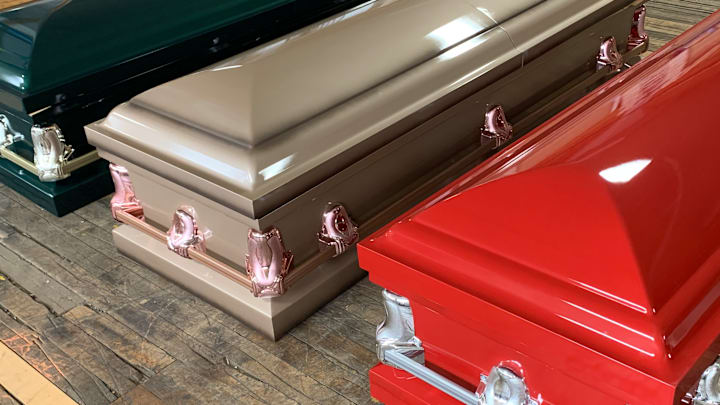While the deceased may not worry much about the cost of being laid to rest, their loved ones certainly do, and the process can be expensive. With the average cost of a funeral in the United States nearly $8000, it only makes sense that a market disruptor could make some headway.
It turns out someone has. Their niche? Direct-to-consumer caskets.
Titan Casket, which was founded in 2016, announced earlier this year that their year-over-year sales grew by 400 percent in 2021. That’s a fairly staggering number considering the conventional pipeline for funeral goods like coffins is typically via funeral homes making the arrangements.
"The company plans to double in size for the next several years in a row," co-founder Josh Siegel tells Mental Floss. "Caskets are a $4 billion industry in the U.S., and only 1 to 2 percent are sold DTC. There's tremendous opportunity for growth as the general public becomes aware they have purchase options outside the funeral home."
Titan credits deals with Sam’s Club and Costco, as well as additional warehouses and air freight, as some of the reasons behind their growth. But industry observers also see it as an opportunity to capitalize on what many feel is a pricey form of grieving: Titan’s caskets are usually about half the price of a coffin sourced from a funeral home and their often-exorbitant mark-ups of 200 to 500 percent.
One of the company’s most economical models, the $999 Titan Andover, is made of steel. The $699 Titan Virtue is made of biodegradable cardboard. The average cost of a casket purchased at a funeral home is roughly $2000.
But price isn't the only lure. "For selection, Titan has 1000-plus models in stock online versus the six to eight models you'd typically find in a funeral home showroom," Siegel says.
While there are regulations in place over the handling of decedents, federal law allows for most anyone to purchase a casket online. The company ships the casket directly to the funeral home—an arrangement that local businesses rarely balk at. "Funeral homes are federally mandated to accept funeral products, including caskets, that their clients buy online," Siegel says. "If a funeral home refuses to accept, charges a fee for delivery, or otherwise burdens the client, they can lose their license. On occasion, we do encounter a funeral home that will mislead the customer about their rights or try to disparage the quality of Titan's products, and in those cases we help educate the client on their rights and speak directly to the funeral home to remind them of their client responsibilities."
Critics of the direct-to-consumer model have said that the online casket market ignores the human component of grieving and mourning. Offering a casket is more than just selling a product, they argue: It’s part of a service helping people say goodbye to loved ones. But Siegel believes Titan can not only fill those needs but improve upon them.
"We plan to expand into all aspects of funeral planning where we can improve our client experience and provide more options," Siegel says. "That means other funeral products like urns, vaults, and flowers, and other funeral services like advance planning, event planning, and obituary writing. We're really just getting started."
